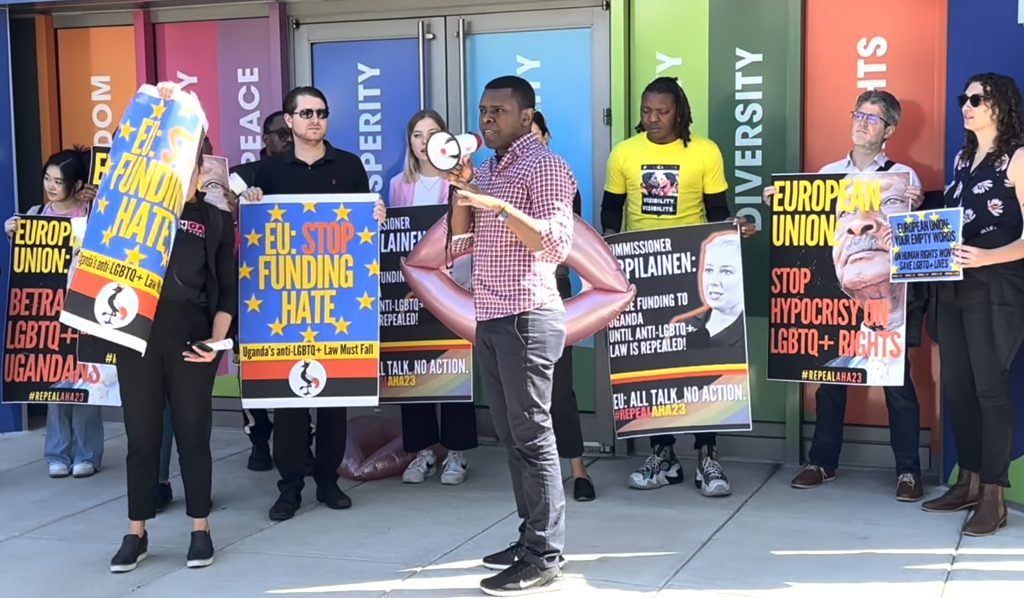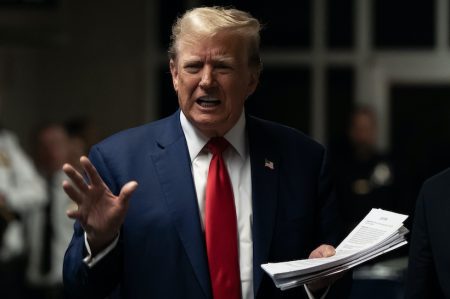People who campaign for change gathered in Washington, D.C. on Thursday to urge the European Union to impose penalties on Uganda for its Anti-Homosexuality Act.
The law is pushing people who are already pushed to the side away from important services and makes discrimination and violence against LGBTQ people in all parts of life part of the government's official policies, the Convening for Equality (CFE) coalition wrote in a letter to EU Commissioner for International Partnerships Jutta Urpilainen before the protest. The group said the European Union should quickly announce a complete review of all its funding to Uganda and should temporarily stop or change any money that goes through government agencies. Any needed help should be sent to non-government organizations that are dedicated to serving and hiring LGBTQ people.
The Anti-Homosexuality Act, signed by Ugandan President Yoweri Museveni last May, has been called one of the most extreme examples of anti-LGBTQ+ legislation in the world. It made what is described in the law as “aggravated homosexuality” punishable by the death penalty, imposed a life sentence for “recruitment, promotion and funding” of same-sex “activities,” and even banned identifying as LGBTQ+.
Earlier this month, Uganda’s Constitutional Court struck down parts of the law — including a provision that made it a crime to fail to report homosexual acts to authorities — but kept its severe punishments for LGBTQ+ people. Ugandan LGBTQ+ activists have appealed the ruling, the Washington Blade reported earlier this week.
The law has drawn international condemnation. Following its enactment last May, President Joe Biden called for the law to be repealed, and in January the U.S. removed Uganda from the list of nations eligible to benefit from the African Growth and Opportunity Act (AGOA), which allows eligible sub-Saharan African nations to export over 1,800 products to the U.S. duty-free. Last August, the World Bank Group suspended new loans to the East African nation, saying that the law contradicts the group’s values.
While the EU’s top diplomat, Josep Borrell, said in a statement last May that the law “is contrary to international human rights law and to Uganda’s obligations under the African Charter on Human and People’s Rights,” in September Urpilainen said that the EU would not suspend aid to the country. Urpilainen wrote in a letter to the European Parliament that suspending Ugandan aid would deprive the country’s most vulnerable populations of vital support and “would also create gaps which may be further filled by other players who do not share EU values,” Reuters reported at the time.
That decision drew rapid criticism from Ugandan LGBTQ+ rights organizations, including the CFE, which organized Thursday’s protest in front of the European Union Delegation to the U.S. in Washington along with Health GAP and Global Black Gay Men Connect.
In its letter to Urpilainen, the CFE criticized her announcement last month of more than €200 million in aid to Uganda “with no mention of how Uganda or affiliated private sector institutions will be held accountable for ensuring non-discrimination and protection of human rights when spending this new EU funding.”
Today we're here because it's our duty as human rights activists from all over the world to speak out against complicity and inaction when lives are at risk, said to the group of more than twelve demonstrators on Thursday. The EU is not taking action in the face of this hate. Instead of just talking, we need them to take action. So today, on behalf of human rights defenders from Uganda and beyond, we're demanding that the EU stops supporting Museveni’s regime of hate, authoritarianism, and anti-democracy, and takes a stand against funding this regime unconditionally.
“We want to send a clear message in Washington, D.C., at the EU office, that we are disappointed in you as an organization,” said Ugandan LGBTQ+ rights activist Hillary Innocent Taylor Seguya. “LGBTQ rights in Uganda are being threatened while you watch. We can't allow human rights abuse to happen today, in the 21st century, under your watch.”
Previously, CFE leader Frank Mugisha agreed with the EU’s Urpilainen that cutting ties with Uganda completely would be a mistake, according to Reuters, but called on the EU to “fine-tune” its aid to the country “in ways that ensure that those who spread hatred and incite violence and discrimination against LGBTIQ people — including Ugandan government officials — won’t benefit from EU taxpayers’ money.”









